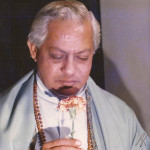Questioner: Guruji, this question arises from the difficulty I have with the concept of the Personal God, God with form and I ask myself what is that form? And then I understand from the things that you have said in the past that the Personal God, Ishvara, continues to exist during the present cycle of creation and then will cease to exist. But there is also the Avatar, who is God in human form who comes from time to time for a limited period. And I wondered if you could explain how the Avatar and the Ishvara are connected.
Gururaj: Beautiful, beautiful. It is said in the Gita that, ‘When there is an imbalance of righteousness and evil persists, I take birth from age to age’. Now, how true is this concept and what is meant by the ‘I’? Who is the ‘I’ that takes birth? Who is the ‘’I that takes birth from time to time? And is it necessary for that Divine force to assume a human form.
Now the Personal God is a concept to please Man’s analytical mind. But yet beyond the Personal God there is the Impersonal God which is an energy, an energy that is qualityless. It has no quality, it is a neutral energy. But now, for this neutral energy to be of some value to the manifested universe, it has to concretise itself. So first, from this impersonal energy – the Brahman as we would know it – has the ability to manifest itself. Now, what do we mean by manifestation? Manifestation is not creation. With the Impersonal God, the totality of all, there is no creation but a manifestation. By manifestation, we mean that it is the nature of the Impersonal, it is the inherent ability of the Impersonal to concretise itself. So, as a flower gives off fragrance the flower does not create fragrance, it is its very nature. As heat is given off from fire, the fire does not create heat but it is the manifestation of the fire and the nature of the fire to exude this heat.
So from the primal impersonal force and, by its very nature of manifestation, the entire universe has come about. But now, being such a subtle force, it cannot concretise itself from one step to the other. From that subtlety, there has to be gradual concretisation. The impersonal force has no power of thinking. When we say God’s Will or ’Thy Will be done’ it is not the Will of the Impersonal God. Will only comes about with the Personal God and not the Impersonal God. So as it would be said in the Bible, ‘First was the Word, and the Word was God and the Word is God’. What is meant there is this, that the very manifestation of the unmanifest impersonal in its concretisation assumed a certain vibration. And it is this vibratory factor, due to its conjunction with other vibrations also exuding from itself, that various forms come about. So the Word which is the vibration, through a long process of evolution, right from the Big Bang, from which this whole universe has been composed, through this process the minuscule atom in its concretisation goes on and on and on.
Now, the first step, the first step of the atom has the ability, the atom has the ability to duplicate itself and replicate itself, for the very replication is inherent in the nature of the atom. So, as it goes further by the force of evolution, it concretises in a very subtle gaseous form. This gaseous form in turn concretises into matter. And this matter, we know, with further concretisation and condensation, this very matter we know as the mineral kingdom. Proceeding from this mineral kingdom, we find it evolving into the plant kingdom, and from the plant to the animal kingdom. Now, throughout this entire process, there is a consciousness. There is consciousness in a stone. If the stone had no consciousness – we think that a stone is inert but a stone too has life, because, if it did not have life, it would not have the quality to change. For if you leave a stone outside, you would find many changes taking place. And through scientific analysis, you would find the stone would have all the atoms – it has a molecular structure and there is intense motion in that stone. And the very motion that we find in all these forms, from stone to plant to animal, is that consciousness or life force.
Now this entire process up to the animal level is an automatic process. The trouble only begins when evolution takes a further step and reaches the stage of man. And that is where all the trouble begins, because man’s inherent quality is thinking. And with these very thoughts, the Law of Karma starts operating. One thought in a particular experience conflicts itself with another thought in another kind of experience. So, with all these experiences building up and up and up, we become the complex beings that we are, filled with all these impressions which we call samskaras in Sanskrit. Now it is the samskaras that are troubling us. All conflicts and all sufferings is not from Divinity. All conflicts and all sufferings are made by man himself and because of his thought processes. Now, how valid is this thought and how real is thought? Thought, although composed of a very fine matter, for thought too is a thing, can only find its validity in the relative form of existence and not beyond it. So through spiritual practices, what we do is go beyond the thought forms. We go beyond the finest levels of matter and into the impersonal, where nothing remains and all the motion that we see become illusory. So all the conflicts, all the waves of the ocean that are so turbulent, are all within the confines of relativity.
There was this chap who was giving a long talk on Einstein’s Theory of Relativity and he tortured this subject for an hour or two hours. So one person got up in the audience and says, ‘You seem to know more about Relativity than Einstein.’ And so this man says, ‘Why do you say that?’ ‘Well, there are only twelve, statistics has proven there are only twelve people in the world that could understand Einstein. But you must be greater because none of us understand you’. (Gururaj laughs) Yes.
So all these problems and troubles that we do have in this world is because of that. Now, where does the Personal God fit into the scheme and what is the Personal God? Most Personal Gods that people believe in are creations of man’s mind. Most people find different kinds of Gods. To one, there might be a God with four arms. To another person, it might be an old man with a long beard and a few dozen Book-keepers writing everything down what each and everyone does, sitting somewhere in the clouds on a golden throne. That is also a concept of man as a Personal God. The concept of God has also been regarded as ‘Father’ – ‘Our Father which art in heaven’, why not Mother? Why not Mother? For if everything emanates from himself then it should contain both aspects of what humanity is all about. It contains the positive as well as the negative aspect. Now, by negative, we do not mean anything bad. It is like electricity where you have the positive current and the negative current to make the bulb burn.
So, we could say the Personal God is a mixture of both qualities and yet for its fullest expression, a division takes place and that is why we have man and woman. And yet, science has proved that in every man there is a bit of woman and in every woman there is a bit of man. So, there has never been any total separation. Now, the totality of the universe from its subtlest level to its grossest level, composes what we know as the Personal God, right from the conscious mind, the analytical conscious mind, to the subconscious and right through to the super-conscious level, which is one vast continuum. And that very continuum is what we call the Personal God. So, in the primal manifestation of the Manifestor, the very vibration that came about, the very vibrations, the Word that condensed itself into various forms is the Personal God. So, being the finest vibration, it would naturally be at the level of the superconscious mind. So, therefore, being at the level of the super-conscious mind, it is naturally universal, for the superconscious mind is the universal mind and every human being is in touch with the universal mind.
So, narrowing that down, we have the sub-conscious level of the mind, which is a repository of all the experiences gained in Man’s evolution. So, when a person prays, for example, the highest he can reach is the superconscious level, through the varying filters of the sub-conscious mind. It reminds me of a priest. Now, this priest spoke to one of his parishioners and he said, ‘My friend, every sentence you use there is a swear word in it. And you must desist from using swear words’. So this fellow replies, he says, ‘That is true. I swear a lot and you pray a lot, but we both mean nothing by it.’ Yes.
So, the sum totality, the sum totality of all relative existence is the Personal God and to find him in his universal aspect we, through spiritual practices and meditation, reach the superconscious level. And when we reach the superconscious level, we find the Personal God, the sum totality of the unmanifest that has manifested itself as mind. So, at the finest level of the mind, resides the Personal God. So when we talk of cosmic consciousness, we, the mind recognises that I am an individual and there is a vastness which I recognise but it is apart from me. And then you have God-consciousness, where you develop this Bhakti Bava, which means this intense sense of devotion and yet you remain apart from God and not a part of God. So that is the kind of God that most religions teach. We go further than the Personal God. We go to the Impersonal God, transcending even the Personal God for we, in meditation, transcend the entirety of the mind and we land in unity-consciousness or Brahman-consciousness, where everything is nothing. Suneeta as the Buddhists would say. But that nothingness contains everything.
There was this one guru to whom a chela approached. He says, ‘Show me the highest value of existence, show me the Impersonal God.’ So the guru says, ‘Right. You see that tree over there, bring me a fruit from the tree’. The chela brought the fruit. He said, ‘Open the fruit’. Fine, that was done. He says, ‘Now get out the pip’. So that was duly done. So the guru says, ‘Open the pip and see what you see therein’. And when he opened the pip, there was nothing in it. Ah, and yet that very nothingness, that very fine, indefinable energy created the pip which created the fruit. So, that is the area through meditation we can reach.
But now, the Personal God who is the sum totality of relative existence is needed, for, the mind could never comprehend the abstract. So, Man’s mind needs something concrete. Now, your Personal God could be anyone. Any object of devotion can become your Personal God, even a stone. Even a stone. Even your wife or your husband.
There is a very favourite story of mine. It is a Persian poem. Shall I tell it to you in Persian? Do you understand Persian? No? Okay. I will give an interpretation of it. The lover knocked on the door of his beloved and the beloved asked ‘Who is it?’ And he says, ‘I am So and So’. The door was not opened. Next day he went again and he knocked on the door and she asks, ‘Who is it?’ He says, ‘I am So and So, the son of So and So’. The door was not opened. And then on the third day when he knocked on the door and he was asked who is it, he said, ‘I am thee, my beloved’. The door was immediately opened.
Do you see the significance that any object of love and devotion can be used as one’s Personal God. When we find that communication and that oneness between subject and object, there the Personal God is found but that is not the end of the journey. To find the Personal God, one develops that devotion, one develops acceptance, one develops surrender. One develops surrender. And through that means, one finds a deep integration within oneself of body, mind and spirit. So, when we cease to live a fragmented life, we find the fullness of life, for now we are operating in totality. We are operating now in totality. And that very totality makes us feel and know and recognise the Personal God and you can say, ‘I and my Personal God are one’.
So here you find oneness with a concrete object. That is why we worship Christ and Buddha and Krishna – a concrete object which could please the mind, a form, a God with form, a God with form and a God with qualities. Therefore all theologies give qualities to God. They regard him to be kind, just, compassionate, merciful. And, by becoming one through devotion and Jnana, analysis, and action, one becomes one with the Personal God and, becoming one with the personal God, we take on the qualities of the personal God, the qualities of kindness, love and compassion.
So to recap on this. The Personal God is the sum totality of relative existence, but the Personal God is not the absolute. It is not the absolute because it has qualities. And beyond that we have the Impersonal God, that neutral energy which is behind it all, the nucleus of the nucleus, of the nucleus, of any atomic structure. And you are all none else but atomic structures, none else but atomic structures. So, being the sum totality of the universe, it can be present everywhere. So when it is present everywhere we call it omnipresent. Being the sum totality, it has to be omnipresent. Being omni-present, being everywhere, it has to be omniscient. And, being everywhere, it has to be omnipotent. Therefore, we call that Personal God, almighty. Not someone sitting on a throne somewhere because then you are adding limitations to God but being Sarvikalpa, as they would say in Sanskrit, is everywhere. But that is the range still of the Personal God.
Now, why does the Personal God want to incarnate as an Avatar? – that is the second part of your question. Why? He does not want to, he does not want to incarnate as an Avatar. He is having a ball up there. (Gururaj laughs) He is having fun. Why does he want to incarnate as an Avatar? You make the Avatar incarnate, you. This world, all the other planets, they make the Avatar incarnate. So, when evil rises, you force to bring that old chap down in human form. Do you see? Right. Now, as every human being has an emanation around him, so collectively there is an emanation too, which we might call aura. Right. Now, a country has its emanations, a town has, a country has, this world has an emanation. And then the universe has its own emanation. And when imbalances occur, like waves in the ocean, at some places the waves are high, at some places the waves are low, yet underlying that is all such beautiful calmness. So, the Personal God or the Avatar is more concerned with the waves than the calmness, for it is for the purpose of stilling the waves that the Avatar comes; not for the calmness, although he is a calmness too.
Now, in many parts of the universe, as energies are shifted around, there comes a time in the life or the duration of any planet or solar system, when there is a greater amount of turbulence. And this turbulence is caused by the emanation of this world, when negativity arises as it is been happening now, where you find excessive permissiveness, intense amount of killing, thoughts and actions that are not conducive to nature, to preserve a balance between the Gunas that compose this world.
Now, the Gunas, Rajas, Tamas and Sattva, which you have heard of and I have spoken about it many times, are not necessarily confined to man. But the entire Earth also is composed of Rajas, Tamas and Sattva because that is a natural force, natural forces. So, because of our thoughts and actions, we allow Tamas to dominate or predominate, and when greater emphasis is placed upon Tamas then a greater imbalance occurs and the darkness and inertia of Tamas overcomes the light of Sattva or the finer quality. So here we have Rajas and Tamas. Tamas is inertia and darkness and Sattva is light and the activating force between those two opposite poles is Rajas, it activates. It makes Tamas and Sattva interact with each other. So, because of our thought forces on this Earth planet, on this planet Earth, we either have a greater amount of Sattva or a greater amount of Tamas. And sometimes we have an equilibrium where all these three Gunas’ qualities are at a steady level. Like the ocean, sometimes it is calm. The currents within it are so well balanced that calmness comes.
So, when a greater amount of thought of a dark nature arises and composes the atmosphere of this planet then it has to be righted. So, the finer energies of the superconscious level or the finest level of relativity is automatically activated and attracted to where it is needed. Do you see? And that we call the incarnation of the Personal God. So, do a lot of evil and you will attract him. Like a magnet, you attract him. He has to come. That positive force has to come to overcome the negative force. Do you see?
Now, why does he take the form of a human being? Why does he take the form of a human being? It is because all the other three mineral, plant and animal are proceeding according to nature and natural laws. They are proceeding according to the push of evolution without impeding the progress. But man with his thinking ability, his cunning mind – the mind which I always call a cunning animal – starts impeding progress and the entire Earth is surrounded by a halo of negativity. As clouds, when they get heavy, they have to come down as rain, so negativity has to be balanced out, although this world cannot exist without Tamas, for it is one of the very components of creation or of existence. So, the Avatar is born. And why is he born as a human being, is because he goes to the trouble spot and human beings are the troublemakers. Do you see? Not the mineral or the plant or the animal they are not troublemakers. They exist according to their natures. So that is why a human form is required.
But now, that Personal God has a lot of problems. The greatest suffering of an Avatar is to be born on Earth, and that is what we know as the suffering of Buddha or the suffering of Christ. Because from that vast universal field, from that super-fine, finest relative, from that vast field, he has to concretise himself into this little body. Can you imagine the pain? So, the Avatar has to go through various gradations. So, from the finest level of relativity, he has to grossify, grossify, grossify himself until he becomes to this level. It is like going through a funnel, so vast at the top and so narrow at the end. And, having to be born through human beings, it has to acquire the characteristics of human beings. Therefore, you will find the greatest Masters, they never start teaching until they reach a mature age. They never do. Because even the Avatar, going through all this dirt, coming to this small little limited level and passing through this vastness of the universe, – I know it, I showed it to you last night how I have to go back to that vastness and you experienced the communion with me. It is a pity my sister missed it, yesterday. You’d have enjoyed it. Yah.
So, going through all this debris, he has to come here and take a bath and that bath, removing that dirt, is an unfoldment of the Avatar himself. And that is why he has to live like an ordinary person, gain the experiences of an ordinary person, to find himself. And then only after having fulfilled his experiences that he realises that ‘I am an Avatar’. Christ realised who he was only on the cross. Although he had experienced the oneness with the Father, ‘I am my Father are one’, but the final realisation came on the cross. And then he knew, he realised what resurrection means. And the same applies to Mahavir. The same applies to Buddha and the same with Krishna. Do you see?
So, in reality man would take lifetimes upon lifetimes upon lifetimes to realise the Divinity that is within them, for the Avatar, knowing it all, finds it very quickly. Therefore, the great teachers have always started teaching, the real Avatars, always after the age of thirty, never before. It takes them that time to realise who they are. And then the work really begins. So, the greatest suffering of an Avatar is coming down to this small little level and dealing with little people. So, he gives forth his teachings and the teachings he would give forth, would be according to what people can understand. During the time of Jesus, he would say – and mostly they were peasant folk – his closest disciples were fishermen and ordinary working men not intellectual geniuses except Judas, who in turn, of course, betrayed him, because he was an intellectual. So, to those people he could say, ‘Believe’ and they believed. But, in today’s world you cannot say ‘Believe’. In today’s world the message that I perhaps would have to give, is not ‘Believe’, but ‘Experience’ and here are the tools I am giving you to experience that.
So, with the development of man’s mind and man has developed very much intellectually at the expense of the heart, so, what we need in this time and age, to balance up the development of the mind, we need the expansion of the heart and therefore you are given the Gurushakti practice. Do you see the reason behind it? Expansion of the heart. Now, as these teachings go forth, there is one difference you will find. You would find the university lecturer talking of the highest philosophies and immediately you will understand him by the mind. But when a mystic, a man of God speaks, you understand him not with the mind only but you feel it in the heart. There is the test. Where does the words enter? Into the mind only? Or into the heart? For transformation of man begins with the heart, not the mind. For the mind, to repeat again, is a cunning animal.
So, that is the job of an Avatar is to activate the heart. And the Avatar never speaks on the intellectual level only. No. That is why the greatest truths we find in the world are in parable form. Why in parable form? Because it leaves you the scope of interpreting it according to the level of your understanding. That is why in parable form. So, even an Avatar cannot lead you to salvation. He only shows you the path that leads you to salvation. But, as I said the other day, you have to walk with your own feet. The light of knowledge and wisdom and spiritual force is not shone upon you but is shone upon the path. It lightens up the path. For that should be the way of your life. That is why we say, ‘That is the way, that is the Life and that is Truth’. So, that is what the Avatar does. And we say that all these great Avatars suffered. No. That is our interpretation that they suffered. To them, it was a joy. And, therefore, it is said in the Scriptures, ‘Be of good cheer’. Because if they were not cheerful themselves, they would not teach you to be of good cheer. It is such a pity that the incarnations we worship are always portrayed with a long, sad face. And yet they had the same principles and the same motto that we have, Life, Love and Laughter. Do you see? They had the same principle that we have, Life, Love and Laughter. And yet amidst all this chaos in the world, they show the way, they show the way.
There was a Surgeon and an Architect and a Politician discussing. So, the Surgeon says that creation is a surgical matter, because Eve was created from Adam’s rib and that is surgery. But the Architect says, ‘No, it is an architectural job because someone had to plan, bring a system in the chaos’. And so the Politician said, ‘That is very true, but who created the chaos?’ (Gururaj laughs).







You like to be God that’s why you can’t use the fact God is the Unlimited Naughty Person. You’re simply in competition with Him and therefore you don’t even understand the continuity of time, space and activity. You’re speculations are due to ignorance, avidya. Perhaps become humble and start worshipping Parabrahman, Krishna, who is avyayam. And reach para bhakti with it.
This is not a website for fundamentalists of any religion, Rob, so you should be reading another blogs. If you think you have something to teach, open a blog and do it!